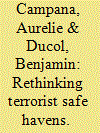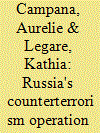| Srl | Item |
| 1 |
ID:
109231


|
|
|
|
|
| Publication |
2011.
|
| Summary/Abstract |
Over the last decade, the term safe haven has stirred controversy both in the political arena as well as in the academic literature. Several authors have emphasised the imprecise and commonly ill-conceived use of this terminology. This article intends to provide a fresh analytical framework to better understand the notion of terrorist safe haven. Rejecting the orthodox state-centric approach that envisions terrorist safe havens solely in their static and territorial dimensions, we focus rather on the social dynamics that characterise these spaces. We contend that although they might appear socially fragmented, these geographical areas are ruled by alternative modes of governance that impose a form of social order regulating interactions among actors. We use the concept of 'social space' to capture the framework in which social interactions between local actors are taking place. While we recognise that the social order that governs a given social space imposes constraints for actors, we contend that it can be subjected to internal contestation, opening a series of opportunities for transnational terrorist networks. We then try to highlight how terrorist groups might take advantage of these internal dynamics and create new ones to ensnare some local actors into forming alliances with them. This article addresses several case studies to further illustrate the theoretical discussion. Finally, we conclude with a discussion of the importance of interpersonal relationships between local and transnational actors. While this article proposes a preliminary analysis of the question, it opens up new research avenues in conceptualising why and how some regions have come to attract transnational terrorist groups.
|
|
|
|
|
|
|
|
|
|
|
|
|
|
|
|
| 2 |
ID:
106619


|
|
|
|
|
| Publication |
2011.
|
| Summary/Abstract |
This article analyzes how Russian Federal policies evolved between 1999 and 2005 to justify the policy of "Chechenization" and the legitimization of an autocratic-style regime in Chechnya. It argues that this strategy was progressively elaborated during the conflict as a result of institutional competition between three main Federal agencies (the Presidential Administration, the secret services (FSB)), and the military over the framing of the conflict. This process paved the way for the formation of the "totalizing frame" under the leadership of the Kremlin, which incorporated various discursive constructions into one coherent and exclusive interpretation of the conflict.
|
|
|
|
|
|
|
|
|
|
|
|
|
|
|
|
| 3 |
ID:
110763


|
|
|
|
|
| Publication |
2012.
|
| Summary/Abstract |
This article proposes a systematic scoping review of the structural "root" causes of non-suicide terrorism. It aims to synthesize the knowledge produced on this very specific issue from 2000 and 2009 and to raise questions about unanswered issues and those that deserve more in-depth investigation. After presenting our methodology, we offer an overview of this subfield of research. We then discuss our main results and explain why no substantive argument on the structural "root" causes of terrorism emerges. We argue that the main gaps lie in the high fragmentation of this subfield, definitional problems, a somehow flexible operationalization of concepts, and a high dependence on sources of questionable reliability.
|
|
|
|
|
|
|
|
|
|
|
|
|
|
|
|